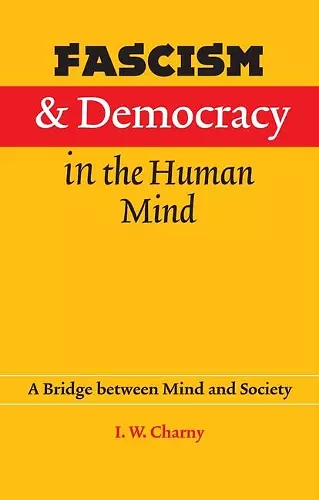Fascism and Democracy in the Human Mind
A Bridge between Mind and Society
Format:Paperback
Publisher:University of Nebraska Press
Published:1st May '08
Currently unavailable, and unfortunately no date known when it will be back

A complex study of the nature of violent behaviour tracing its psychological origins on an individual and social level
Defines two paradigms of mental organization, the democratic and the fascist, and shows how these systems can determine behavior in intimate relationships, social situations, and events of global significance. This book develops directions for diagnosis and treatment of emotional disorders that are played out in everyday acts of violence.What might you have done if you had been caught up in the Holocaust? In My Lai? In Rwanda? Confronted with acts of violence and evil on scales grand and small, we ask ourselves, baffled, how such horrors can happen—how human beings seemingly like ourselves can commit such atrocities. The answer, I. W. Charny suggests in this important new work, may be found in each one of us, in the different and distinct ways in which we organize our minds.
An internationally recognized scholar of the psychology of violence, Charny defines two paradigms of mental organization, the democratic and the fascist, and shows how these systems can determine behavior in intimate relationships, social situations, and events of global significance. With its novel conception of mental health and illness, this book develops new directions for diagnosis and treatment of emotional disorders that are played out in everyday acts of violence against ourselves and others. Fascism and Democracy in the Human Mind also offers much-needed insight into the sources and workings of terrorism and genocide. A sane, radical statement about the guiding principles underlying acts of violence and evil, this book sounds a passionate call for the democratic way of thinking, which recognizes complexity, embraces responsibility, and affirms life.
Charny, I.W. Fascism and democracy in the human mind: a bridge between mind and society. Nebraska, 2006. 471p bibl index afp ISBN 0803215509, $49.95 Because he fears humanity's increasing capacity to destroy itself, Charny (psychology, Hebrew Univ., Jerusalem, and editor of the outstanding two-volume Encyclopedia of Genocide, CH, Jun'00, 37-5432) assumes the daunting task of attempting, first, to define the individual mind as either fascistic or democratic and, second, of linking the resulting paradigm to the wider society. Adopting tedious computer jargon, Charny argues that ""fascist-mind software"" requires ""that a person create and live in a world prescribed, defined, and ordained by [an] immutable authority"" that provides ""a clear sense of direction"" tolerating no deviation. On a societal level, this ""software"" leads to punishment, torture, execution, and, possibly, genocide. By contrast, ""democratic-mind software"" implies acceptance of uncertainty and vulnerability, while exulting in its respect for human diversity. Although historians may find Charny's terminology odd--""fascism"" and ""democracy"" are peculiarly modern notions--and his personality universals overly restrictive in a world of infinite possibility, behavioral scientists need to confront this innovative thesis. By adding to the pressing discussion of how human civilization is to survive its frightening technological capabilities, Charny performs a valuable service. Though it is in places didactic and marred by repetition, this is a pathbreaking endeavor. Summing Up: Essential. Lower-division undergraduates through faculty.|""Charny argues persuasively that fascism and democracy are not only political systems but ways of organizing the mind. His book builds a convincing link between societal evil and the mind of the individual perpetrator. . . . [This is] one of the most important books of this decade.""—Douglas H. Sprenkle, a professor of marriage and family therapy and the author of Effectiveness Research in Marriage and Family Therapy|""Charny suggests new principles and approaches for individual and family therapy as well as for reducing the danger of future war, genocide, and terrorism. This is a hopeful and useful book, despite also being a wakeup call, insofar as it demonstrates how deeply-rooted the fascist mentality can become in individuals and societies.""—Eric Markusen, a sociologist and the coauthor of The Genocidal Mentality: Nazi Holocaust and Nuclear Threat|""Charny's understanding that fascism and democracy are not just political systems, but psychological states or forces gives us powerful tools for a holistic approach to fighting much that is evil. Charny’s theory gives us a way of understanding that we are all on a continuum, from Hitler as perhaps the purest example of a mind given over entirely to 'totalitarianism,' to those who enact a 'democratic' life. As many of us are, I am certainly far from the 'democratic' ideal, but struggling toward it.""—Henry Theriault, an associate professor of philosophy and coordinator of the Center for the Study of Human Rights at Worcester State College in Massachusetts|""Momentous. . . . [This is] the most innovative piece of scholarship I have ever read. Fascism and Democracy in the Human Mind is extremely timely and it offers suggestions about ways to go forward in conflict resolution at the societal, family, and individual levels. I know of no other books in psychology or Holocaust and genocide studies that have linked societal and individual processes in as innovative a way as this book does.""—Robert K. Hitchcock, an anthropologist and coeditor of Endangered Peoples of Africa and the Middle East: Struggles to Survive and Thrive|“To read Fascism and Democracy in the Human Mind is to embark on a journey into one’s own mind and, at the same time, into the human collectivity. The work asks us to reflect on who we are as individuals and as global citizens. By explicitly linking micro and macro structures and processes—whether internal and psychological, or external and political—Israel Charney has rendered a work of extraordinary importance. . . . . Charny writes in an accessible, engaging style, and this book’s appeal will extend far beyond the many academic disciplines to which it relates.”—Nicholas Robins, Journal of Genocide Research
ISBN: 9780803217966
Dimensions: unknown
Weight: 720g
492 pages